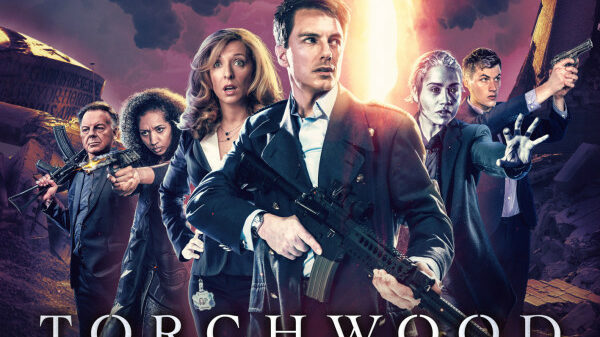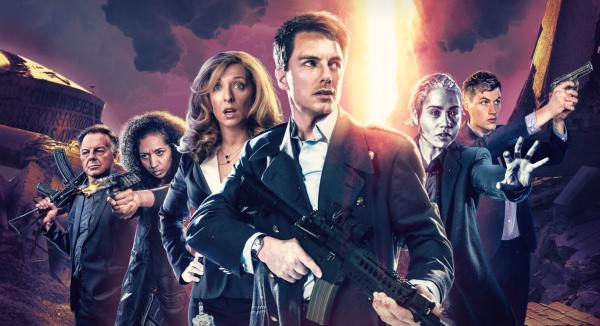What will immediately strike many listeners picking up this latest Torchwood boxset from Big Finish (the four-story God Among Us Part 1) is how rich, layered and intricate the post-TV mythology of the Torchwood canon has become. With few concessions to anyone tuning in for the first time, this is not the most straightforward of entry points to the work of Cardiff’s finest alien repellents on audio.
The Torchwood Three team has itself evolved into a very different beast. Captain Jack Harkness is back battling the baddies, but it’s the reborn Yvonne Hartman who is calling the shots. Orr, the genetically-engineered sexual psychomorph; and Ng, the former Gwen Cooper imposter, are now integral to the group. In close orbit are Colin Colchester-Price, grieving the loss of his husband St John Colchester; ever-dependable Cardiff copper Andy Davidson; and morally-ambiguous former journalist and PR-consultant Tyler Steele.

What is on offer here is a strong, diverse set of stories that explore the terrain of a profoundly changed city. “Cardiff’s been invaded by aliens… thousands of them; taking over, running everything,” explains PPI cold-caller Tyler to one telephone prospect. “City in ruins, a god on the loose and, yeah, a lot of people are dead.”
Opener Future Pain, penned by James Goss, makes great play of juggling with multiple story lines. In the cells of Torchwood, Hartman has the unrepentant former alien mayor of Cardiff in custody; the pair locked in a battle of wills. Colin delivers a heartfelt oration at his partner’s funeral, but the solemnity of the occasion is overturned when a huge god creature arrives on the hunt for a very particular prize: the pain that the prey will endure in their future lives. Harkness and Tyler are pulled into the struggle to frustrate the ambitions of a god. Goss has written an emotionally astute and extremely relatable script, which finds new ways to explore one of the series’ recurring themes: the personal and collective costs which accrue to association with Torchwood’s mission.
There’s a striking contemporary resonance to the plot of The Man Who Destroyed Torchwood by Guy Adams. The patsy of the piece is Brent Hayden, a conspiracy-obsessed vlogger with a wildly inflated self-image. Hayden is convinced his evidence-free investigations and crazed speculations will bring the truth of Torchwood into public view. Anti-hero Tyler is the seemingly-reluctant “source” that Hayden is keen to exploit in return for social media recognition. The one single-strand story in the set, Adams is clearly enjoying the ability the premise provides to poke fun at righteous, self-absorbed keyboard warriors. There aren’t too many surprises in the way the story unfolds, but Hayden’s socially reclusive conspiracy obsessions are convincingly brought to life through Tom Forrister’s energetic portrayal of the tightly-wound loner.
John Dorney’s See No Evil pivots on a brilliant conceit. The story sees different members of the Torchwood group thrown in peril when the city is plunged into intense darkness, and the population loses the ability to see. A predator is stalking the streets of Cardiff, picking off those now unable to defend themselves. Civilisation and civility both seem to crumble with alarming speed, and Torchwood’s special tech only brings a marginal advantage to those trying to shine a light on the crisis.
Taking inspiration from both Pitch Black and The Day Of The Triffids, Dorney’s script is lit up by some sparkling dialogue, with the ill-matched pairing of Sergeant Andy Davidson and Yvonne Hartman providing some of the episode’s most memorable scenes. There are two major plot arc revelations in the story – one of which is certain to have repercussions further down the line, while the other evolves into one of the cliffhangers of the closing episode.
Night Watch by Tim Foley shares much of the same melancholic and reflective tone that shapes Future Pain, although the finale is even more of a character piece than the opener. It begins with the phenomenon of the soporific Black Sun forcing its way through the Rift and bringing unasked-for, restless sleep to the residents of Cardiff. Only the lucky few escape enforced narcolepsy, but they struggle with their own weird experiences in a crossover consciousness in which friends, family and acquaintances are asleep.
Stranger still is that some of those in no-sleep limbo are visited by the departed; have unsettling half-awake experiences; or discover themselves in the company of a wide-awake guide. There are some brilliantly played out conflicts amongst the “woke” at Torchwood HQ and, without giving away too much, several characters experience hugely challenging personal tests and epiphanies during the course of the long night.
This is a very effective set of stories, poignant and exciting in equal measure, and with questions of character, morality and mortality at the core of all four episodes. The writers and the excellent cast get great value from the unstable context in which the team is now working. Members of Torchwood are squabbling, reluctant to trust each other’s motivations, reeling from previous hurts and following different personal agendas. With the return of a former agent certain to increase that sense of instability and distrust, team Torchwood are not in the best of states to confront any malevolent deities with planet Earth (or even just Cardiff) still in their sights.
![]()

